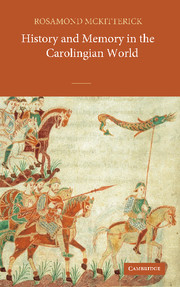Book contents
- Frontmatter
- Contents
- Preface
- Acknowledgements
- List of abbreviations
- 1 Introduction: History and memory in the Carolingian world
- 2 Carolingian history books
- 3 Paul the Deacon's Historia langobardorum and the Franks
- 4 The Carolingians on their past
- 5 Politics and history
- 6 Kingship and the writing of history
- 7 Social memory, commemoration and the book
- 8 History and memory in early medieval Bavaria
- 9 The reading of history at Lorsch and St Amand
- 10 Texts, authority and the history of the church
- 11 Christianity as history
- 12 Conclusion: History and its audiences in the Carolingian world
- Bibliography
- Index of manuscripts
- General index
3 - Paul the Deacon's Historia langobardorum and the Franks
Published online by Cambridge University Press: 15 December 2009
- Frontmatter
- Contents
- Preface
- Acknowledgements
- List of abbreviations
- 1 Introduction: History and memory in the Carolingian world
- 2 Carolingian history books
- 3 Paul the Deacon's Historia langobardorum and the Franks
- 4 The Carolingians on their past
- 5 Politics and history
- 6 Kingship and the writing of history
- 7 Social memory, commemoration and the book
- 8 History and memory in early medieval Bavaria
- 9 The reading of history at Lorsch and St Amand
- 10 Texts, authority and the history of the church
- 11 Christianity as history
- 12 Conclusion: History and its audiences in the Carolingian world
- Bibliography
- Index of manuscripts
- General index
Summary
The conquest of Lombardy in 774 is universally recognized, both by contemporaries and by modern historians, to have been one of the most momentous events in Charlemagne's reign. As an action it can easily be understood as one in a succession of campaigns and incorporations of territory by the Frankish ruler, from the subjugation of Aquitaine to the annexation of Bavaria, the oppression of the Saxons and the destruction of the Avars. All these conquests are presented in the Frankish sources as divinely supported victories and the bringing of many people under Frankish rule. Yet the process by which Charlemagne consolidated his rule in the Lombard kingdom of Italy, and the cultural and religious consequences of 774, for both Franks and Lombards, are far less easy to determine. In the past, moreover, much excellent research has been done, first of all to establish the state of Lombard culture in the second half of the eighth century and, secondly, what in cultural and artistic terms Lombards were able, either potentially or actually, to contribute to Frankish culture.1 In the case of San Vincenzo in central Italy, moreover, recent confidence in the strength of Carolingian, as distinct from Lombard and Beneventan, influences in the development of the abbey would appear to be misplaced. A focus on the reception of Frankish culture in northern and central Italy and the nature of Franco-Lombard cultural relations, especially in the immediate aftermath of 774, has been less constant and it is this which is my concern in this chapter.
The need for questions about the interaction between Franks and Lombards is nowhere more apparent than in discussions of Paul the Deacon and his historical writing.
- Type
- Chapter
- Information
- History and Memory in the Carolingian World , pp. 60 - 83Publisher: Cambridge University PressPrint publication year: 2004
- 1
- Cited by



